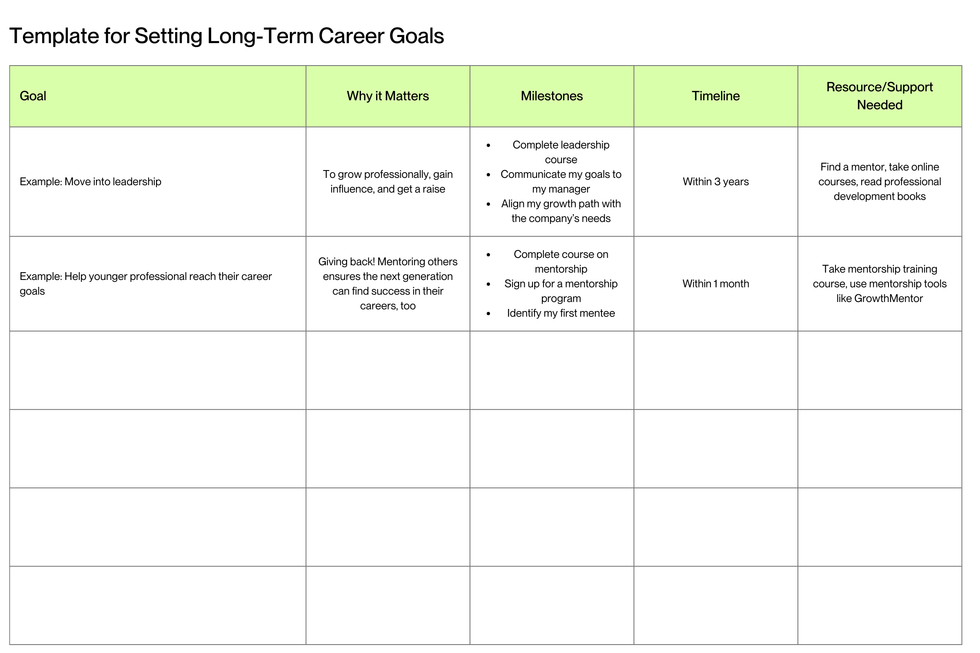There’s no two ways about it; setting and accomplishing long-term career objectives needs an intentional strategy. A detailed plan helps align your actions with your goals, whether you're just starting out in your career or looking to switch jobs (or industries). Setting concrete goals is your road map for overcoming obstacles and taking advantage of opportunities. With the right framework, you can turn big goals into manageable pieces and make consistent progress all year long!
This guide is all about how to properly set goals, make a plan, and monitor your progress. You can stand out and confidently pursue your dream career by concentrating on achievable objectives.
What are long-term career goals?
Long-term career goals are the greater aspirations that guide your professional journey over a significant period of time, typically over five to 10 years. They reflect what you want to accomplish in your career, such as: gaining leadership roles, acquiring specialized expertise, or transitioning into a new industry.
Examples of long-term career goals could include:
- Becoming an executive in your company.
- Launching your own business.
- Achieving a balance between work and personal life.
Read this next: 12 tips for setting better goals
Why do long-term career goals matter?
Setting long-term career goals brings clarity, motivation, and direction. Without a clear vision for the future, it is easy to lose focus or waste energy on endeavors that do not connect with your goals. Here are a few reasons why these objectives are important:
- Provides purpose: Having long-term goals connects your everyday tasks to a larger vision, providing you a sense of purpose.
- Encourages growth: Working toward ambitious goals encourages you to develop new talents and move outside of your comfort zone.
- Helps prioritize: Clear goals help you focus on what is genuinely important and make better career decisions.
Watch this next: Re-thinking goal-setting: performance to purpose
Examples of long-term career goals
Here are three relatable long-term career goals examples with real-world scenarios:
1. Becoming a team leader
Scenario: Maria is a mid-level professional who seeks to lead a team at the company she works at. Over the next five years, she intends to improve her leadership skills, take on more responsibility, and foster trust among her peers.
Explanation: Maria's ambition reflects her desire for professional development and recognition. To accomplish this, she focuses on building soft skills such as communication, delegation, and conflict resolution.
Read this next: More than a boss: How to develop leadership skills
2. Pivoting into software engineering
Scenario: Alex, a marketing specialist, has a seven-year plan to learn coding, build a portfolio, and obtain certifications in order to transition into a software engineering role at a tech company.
Explanation: This goal signifies a career pivot, requiring Alex to network within the tech industry and invest in new skills.
Do this next: Free coding bootcamp with SkillCrush
3. Becoming a recognized leader in digital marketing
Scenario: Priya is a digital marketer who hopes to become a keynote speaker and thought leader in her field within the next ten years. Her goals include mastering public speaking, authoring a book, and expanding her own brand.
Explanation: Priya's long-term objective integrates skill development and personal branding to achieve reputation in her industry.
Read this next: Master the art of public speaking
How to set long-term career goals: a step-by-step guide

Long-term career goal-setting can look pretty daunting at first, but it becomes practicable and inspiring when broken down into simple steps. Visualize your ultimate career goals first, then work backward to determine the milestones and concrete actions that will get you there. This approach guarantees that your objectives are both ambitious and realistic. Also keep in mind that the journey will continue to be relevant and fulfilling if your goals are in line with your own values and passions.
Start with a template
Above, you'll find a simple template to assist you in structuring your long-term career goals.
It includes:
- Goal: What do you want to accomplish?
- Why it matters: Why is this goal significant to you?
- Milestones: What steps will you take to accomplish it?
- Timeline: When do you aim to achieve each milestone?
- Tracking progress: How will you measure your growth?
- What job do I have?
- What skills or expertise do I bring to the table?
- Where do I work, and what does my routine look like?
2. For “why it matters,” consider:
- How does accomplishing this objective fit into your long-term goals or personal values?
- How will achieving this goal influence your level of job satisfaction?
3. For “milestones,” consider:
- What minor successes will give you the boost you need to reach your objective?
- Do you need to receive any particular training, credentials, or experiences?
- What is a realistic timeframe to achieve each milestone?
- Are there specific deadlines for completing certifications, gaining experience, or applying for roles?
- How can you break the overall timeline into smaller, manageable segments to stay on track?
5. For “tracking progress,” consider:
- Will you track your accomplishments through Trello, Notion, or SkillMeter?
- How frequently—weekly, monthly, or quarterly—will you evaluate your progress?
Read this next: How to achieve your personal and professional goals
Track and adjust your goals regularly
Adjusting your objectives when conditions change, and new opportunities offer themselves is a normal part of the process and definitely does not mean failure. You can review your progress, reassess your priorities, and adjust to any changes in your personal or professional life by checking in with your goals on a regular basis.
- Use tools like Notion, Trello, or SkillMeter to keep visibility into your goals.
- Plan monthly or quarterly reviews to evaluate your progress and adapt your milestones as required.
Read this next: How to build a professional development plan
Celebrate wins along the way
Acknowledging your accomplishments, even if they are small, is essential for maintaining motivation and momentum. Recognizing your accomplishments can be as simple as treating yourself to something special, sharing your progress with a mentor, or simply reflecting on how far you've come.
- Maintain a "wins journal" to keep track of all of your accomplishments, no matter how small.
- To stay inspired and remind yourself of your progress, acknowledge your accomplishments.
Read this next: Mastering the art of celebrating your wins
Propel your career with long-term career goals
Establishing long-term career goals is more than just making plans for the future; it's about laying out a successful path that meets your values, skills, and ambitions. You can achieve your dream career by setting specific goals, monitoring your progress, and acknowledging your accomplishments. Although you’ll have to be dedicated and committed, the benefits are priceless in terms of both professional and personal development.
Reviewing your plan on a regular basis guarantees that you’ll stay on course, even when challenges in life arise. Keep in mind that making progress is just as vital as reaching your goal, and acknowledging your accomplishments, no matter how minor, will motivate you to keep going.






